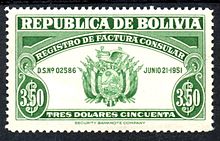- Consularization
-
 A Bolivian revenue stamp of 1951 to collect the fee on consular invoices.
A Bolivian revenue stamp of 1951 to collect the fee on consular invoices.
In international law, consularization is the act of authenticating any legal document by the consul office, by the consul signing and affixing a red ribbon to the document.
Several countries, such as the Dominican Republic, require that exportation documents be consularized in the country of export before the goods arrive at port, and impose a penalty upon any goods arriving at a port accompanied by documents that have not been consularized.[1] Typically, a special consular invoice, prepared in the language of the destination country, is submitted to a consular office in the country of export.
At the General Agreement on Tariffs and Trade round in 1952, it was proposed that consularization of commercial invoices be abolished. In 2005, the United States and Uganda submitted a proposal to the World Trade Organization to abolish consularization.
In addition to shipping documents, other documents that may be required to be consularized include travel documents (such as a parental consent letter for persons under 18 traveling without a parent), letters of credit, and powers of attorney.
References
- ^ "Waiver of consular invoice for Exports to the Dominican Republic - Dominican Republic". Trade Commissioner Service. http://www.infoexport.gc.ca/ie-en/DisplayDocument.jsp?did=58070. Retrieved 2006-01-19.
Categories:- Business terms
- Business law
- International law
- Legal term stubs
- International law stubs
Wikimedia Foundation. 2010.
